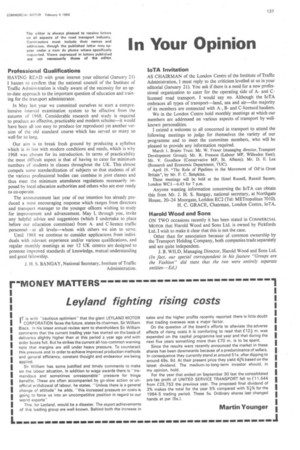Leyland fighting rising costs
Page 139

If you've noticed an error in this article please click here to report it so we can fix it.
IT is with "cautious optimism" that the giant LEYLAND MOTOR CORPORATION faces the future, states its chairman, Sir William Black. In his latest annual review sent to shareholders Sir William comments that the current trading year has started on the basis of deliveries slightly higher than at this period a year ago and with order books full. But he strikes the current all-too-common warning note that margins are still under heavy pressure. To counteract this pressure and in order to achieve improved production methods and general efficiency, constant thought and endeavour are being applied.
Sir William has some justified and timely comments to make on the labour situation. In addition to wage awards there is "tremendous and sometimes unreasonable" pressure for fringe benefits. These are often accompanied by go-slow action or unofficial withdrawal of labour, he states. "Unless there is a general change of attitude" he adds, "this increased pressure on costs is going to force us into an uncompetitive position in regard to our world exports"
This, for Leyland, would be a disaster. The export achievements of this leading group are well known. Behind both the increase in
sales and the higher profits recently reported there is little doubt that trading overseas was a major factor.
On the question of the board's efforts to alleviate the adverse effects of rising costs it is comforting to read that £12+ m. was expended on the capital programme last year and that during the next five years something more than £70 m. is to be spent.
Since the results were recently announced the market in these shares has been downwards because of a predominance of sellers. In consequence they currently stand at around 51s. after dipping to around 49s. 9d. At their present price they yield Lli% based on the latest dividend. The medium-to-long-term investor should, in my opinion, hold.
For the year that ended on September 30 last the consolidated pre-tax profit of UNITED SERVICE TRANSPORT fell to £11,544 from £25,753 the previous year. The proposed final dividend of 3% makes the total for the year 5% compared with 5+% for the 1964-5 trading period. These 5s. Ordinary shares last changed hands at par (5s.).
Martin Younger




































































































































































































